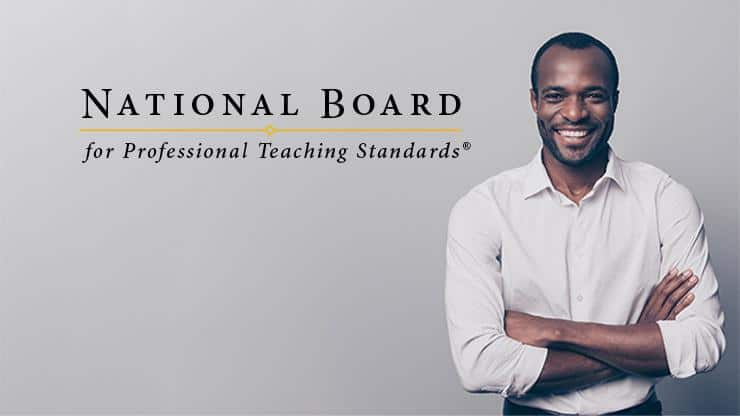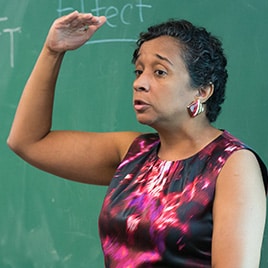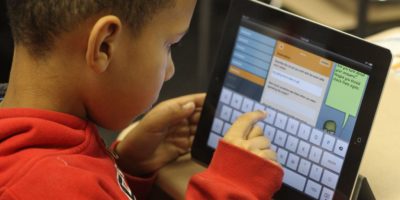Welcome to our monthly feature on EducationNC called the NC STEM ScoreCard, written in partnership with the NC Science, Mathematics, and Technology Education Center (SMT) and the Burroughs Wellcome Fund. The previous edition of the STEM ScoreCard featuring the William and Ida Friday Institute for Educational Innovation can be found here.
The goal of the NC STEM ScoreCard is to build broader awareness of how P-20 STEM* education is being nurtured across North Carolina and the impact on the well-being of our citizens and state. Three key questions framing this goal are:
- In what ways does the state directly invest in programming and innovations that promote STEM learning?
- In what ways are significant philanthropies and other organizations supporting STEM education and learning in North Carolina?
- What measurable impacts is North Carolina realizing from its strategic investments?
*Note: STEM here is an acronym for Strategies That Engage Minds
Strategic investment in specific programs that increase the numbers, quality, and impact of STEM teachers in North Carolina is a central focus of the NC STEM ScoreCard. One of those investments is in the National Board for Professional Teaching Standards.


What does it mean to have a National Board Certification?
As stated on the state Department of Public Instruction’s website, the National Board Certification, offered by the National Board For Professional Teaching Standards (NBPTS), is a way to recognize the accomplished teaching that is occurring in North Carolina’s classrooms. The certification process is based on high and rigorous standards that evaluate teaching practice through a performance-based assessment. The ultimate result is improved performance and achievement for North Carolina’s students.
The NBPTS mission is to advance the quality of teaching and learning by:
- Maintaining high and rigorous standards for what accomplished teachers should know and be able to do.
- Providing a national voluntary system certifying teachers who meet these standards.
- Advocating related education reforms to integrate National Board Certification in American education and to capitalize on the expertise of National Board Certified Teachers.
At the core of the NB certification process are standards that describe the highest level of teaching in different disciplines and with students at different developmental levels. These standards represent a consensus among accomplished teachers and other education experts about what accomplished teachers should know and be able to do. NBPTS Standards can be found at www.nbpts.org or here.
The NBPTS is designed to collect standards-based evidence of accomplished teaching across four components:
- content knowledge
- differentiation in instruction
- teaching practice and classroom environment
- effective and reflective practitioner
Five core propositions
First published in 1989 and updated in 2016, What Teachers Should Know and Be Able to Do articulates the National Board’s Five Core Propositions for teaching. The Five Core Propositions — comparable to medicine’s Hippocratic Oath — set forth the profession’s vision for accomplished teaching. Together, the propositions form the basis of all National Board Standards and the foundation for National Board Certification.
- Teachers are committed to students and their learning.
- Teachers know the subjects they teach and how to teach those subjects to students.
- Teachers are responsible for managing and monitoring student learning.
- Teachers think systematically about their practice and learn from experience.
- Teachers are members of learning communities.
State rankings by total number of National Board Certified Teachers
North Carolina, with 22,635 NB certified teachers, had about 18% of the total number of NB teachers in the United States (125, 875) at the end of 2019. The financial incentives offered to teachers to prepare for the NB examination process and the significant salary boost (12% for 10 years and extended for re-certification) for achieving NB Certification have been effective in attracting teachers to the NB certification process.
Below is a current ranking of the top five states for NB certified teachers. For the most current numbers of candidates and the total number of NB teachers in each state and DC, click here.
| Rank | State | Total NB Certified Teachers |
| 1 | North Carolina | 22,635 |
| 2 | Florida | 13,552 |
| 3 | Washington | 11,368 |
| 4 | South Carolina | 9,226 |
| 5 | California | 7,329 |
Data on STEM-related certifications of National Board Teachers in North Carolina
Certification Legend for the table below:
GEN/EC – General Early Childhood
GEN/MC – General Middle Childhood
MATH/AYA – Math Adolescence and Young Adulthood
MATH/EA – Math Early Adolescence
SCI/AYA – Science Adolescence and Young Adulthood
SCI/EA – Science Early Adolescence
| Achievement Year | GEN/EC | GEN/MC | MATH/AYA | MATH/EA | SCI/AYA | SCI/EA |
| 1995 | 3 | 10 | ||||
| 1996 | 22 | 24 | ||||
| 1997 | 19 | 18 | 14 | |||
| 1998 | 102 | 77 | 23 | 24 | ||
| 1999 | 189 | 161 | 43 | 30 | 50 | 11 |
| 2000 | 260 | 218 | 36 | 42 | 59 | 32 |
| 2001 | 276 | 215 | 53 | 41 | 49 | 30 |
| 2002 | 216 | 216 | 65 | 58 | 34 | 28 |
| 2003 | 282 | 206 | 56 | 76 | 37 | 41 |
| 2004 | 266 | 254 | 46 | 71 | 39 | 25 |
| 2005 | 212 | 247 | 25 | 76 | 46 | 23 |
| 2006 | 302 | 230 | 37 | 46 | 31 | 31 |
| 2007 | 308 | 200 | 54 | 42 | 54 | 23 |
| 2008 | 303 | 162 | 40 | 56 | 46 | 30 |
| 2009 | 264 | 157 | 48 | 60 | 42 | 29 |
| 2010 | 346 | 284 | 89 | 83 | 71 | 52 |
| *2011 | 218 | 155 | 40 | 38 | 43 | 22 |
| 2012 | 98 | 81 | 23 | 29 | 31 | 22 |
| 2013 | 50 | 31 | 9 | 12 | 13 | 11 |
| 2014 | 65 | 34 | 14 | 22 | 24 | 10 |
| 2015 | 43 | 23 | 14 | 4 | 11 | 5 |
| 2016 | 10 | 14 | 4 | 7 | 3 | |
| 2017 | 85 | 45 | 30 | 37 | 18 | 26 |
| 2018 | 80 | 49 | 35 | 22 | 16 | 22 |
| 2019 | 130 | 68 | 31 | 28 | 24 | 18 |
| Grand total | 4149 | 3179 | 829 | 880 | 765 | 491 |
*The decline in numbers of NB teachers beginning in 2011 came about, in large part, because NB rolled out test components over a period of three years, thus not all components were available for teachers to access.
Research on the impact of NB Certification in North Carolina
As stated on the Department of Public Instruction’s website, there is consensus that teacher quality is the most important school-based variable determining how well a child learns. It explains why all Americans should care about what it will take to create and sustain a teaching workforce defined by accomplished practice.
Teachers who have participated in National Board Certification have overwhelmingly stated it is the most powerful professional development experience of their careers. They say the experience changes them as professionals and that through the process they deepen their content knowledge and develop, mastery and reflect on new approaches to working with their students.
According to research conducted by the University of North Carolina at Greensboro, teachers who have achieved National Board Certification by the National Board for Professional Teaching Standards (NBPTS) significantly outperform their peers who are not Board Certified on 11 of 13 key dimensions of teaching expertise. Based on student work samples, the study’s authors declared that National Board Certification “is identifying and certifying teachers who are producing students who differ in profound and important ways from those taught by non-certified teachers.”


What do the experts say?
Charlotte, NC (2010):
“We found that NBCTs were significantly more effective … than their non-NBCT counterparts in several EOC tested courses: Algebra II, Biology, Civics and Economics, Chemistry, and Geometry.”1
North Carolina, Ohio, and the Washington, D.C. area (2008):
“Seventy-four percent of student work samples in the classes of NBCTs were judged to reflect a level of deeper understanding … with twenty-nine percent of the work samples of [students] of non-NBCTs.”2
North Carolina (2007):
“We find consistent evidence that [Board certification] is identifying the more effective teacher applicants and that National Board Certified Teachers are generally more effective than teachers who never applied to the program.”3
Eligibility criteria for state funding
There is a deadline to apply for the loan each year or until all funds are dissolved, whichever comes first.
The loan ($1,900) can be borrowed by first-time candidates only and it will pay for all four Components. This loan cannot be used for renewal and retake candidates or borrowed in increments.
- National Board Certification Loan by the NC State Education Assistance Authority
- New North Carolina Funding Information
- Truth in Lending Disclosure
Candidates are eligible for the state loan program if they:
- are paid entirely from state funds.
- have completed three full years in North Carolina Public Schools (This includes DOC, DHHS, Office of Juvenile Justice, and public charter schools).
- hold a valid, clear, continuing North Carolina teaching license.
To learn more about NBPTS in North Carolina
- For more information about state assistance, completing the application, or candidate support contact Dr. Sonja Brown, NC Program Director, at 919-807-3358.
- LaAlice Hopkins; North Carolina Association of Educators, Center for Teaching and Learning at 1-800-662-7924 x227.
To find the NB contact in every NC county, go to: NBC Coordinator.
Questions for maximizing this strategic investment in STEM teacher quality in North Carolina
- NB teachers are remarkable resources for North Carolina. How can the state and districts better leverage NB teachers to broaden their possible impacts on other teachers?
- What strategies are public and private teacher preparation programs in North Carolina using to capitalize on the considerable knowledge and skills of NB teachers generally and on STEM teacher preparation specifically? How could these strategies be shared across the state and beyond?
- Given the sustained decline in the number of STEM teachers seeking National Board Certification since 2011 (though up in 2019), are there policies the governor and General Assembly should consider in order to attract more STEM teachers, especially minorities and males to seek NB Certification?
Special thanks to Sonja Brown, Education Program Director Recognition and Advancement Programs, NC Department of Public Instruction and Richard Klein, Director, Communications, National Board for Professional Teaching Standards for their considerable help in compiling this NC ScoreCard report. Send questions and comments on the NC STEM ScoreCard to coble@tpanalytics.com.






